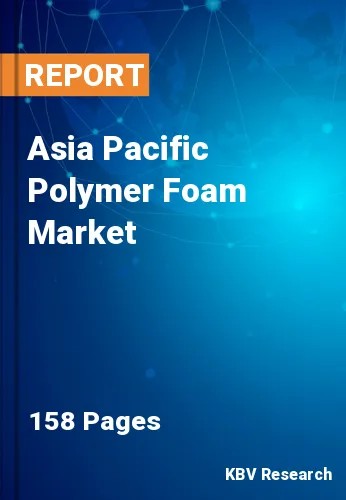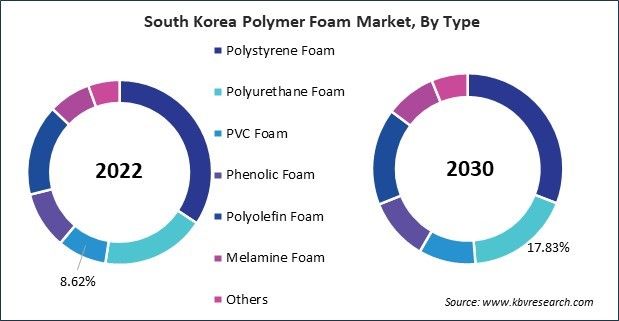
The Asia Pacific Polymer Foam Market would witness market growth of 7.5% CAGR during the forecast period (2023-2030). In the year 2021, the Asia Pacific market's volume surged to 20,281.0 million square meter, showcasing a growth of 6.8% (2019-2022).
Polyurethane foam is a versatile and widely used type of polymer foam in the polymer foam market. Known for its exceptional cushioning, insulation, and structural properties, polyurethane foam finds extensive applications across various industries. Thus, the China market utilized 549.9 million square meter Polyurethane foam in 2022.

The China market dominated the Asia Pacific Polymer Foam Market by Country in 2022, and would continue to be a dominant market till 2030; thereby, achieving a market value of $24,782.8 million by 2030. The Japan market is exhibiting a CAGR of 6.8% during (2023 - 2030). Additionally, The India market would experience a CAGR of 8.1% during (2023 - 2030).
In the construction industry, polymer foams are used for thermal insulation in walls, roofs, and floors, helping improve energy efficiency and indoor comfort levels. Foams provide insulation and moisture resistance in roofing and flooring applications, enhancing building durability and longevity. Additionally, foams may be used as lightweight fillers or cores in composite structures, reducing weight and construction costs. For instance, as per the Agencia de Noticias of the Government of Brazil 2021, the Brazilian construction sector generated R$377.8 billion in value in 2021, with R$355.8 billion in works and services.
Polymer foams play a crucial role in the packaging sector. For instance, foams are molded into various shapes and sizes to cushion and protect fragile items during transportation and storage, minimizing damage and losses. Foams line shipping containers and packaging boxes to provide shock absorption and impact resistance, ensuring the safe delivery of goods. In addition, foams are used for temperature-sensitive products, providing thermal insulation and preserving product integrity during transit.
Similarly, polymer foams play a crucial role in enhancing safety features in vehicles by providing impact absorption and crash protection. The National Investment Promotion and Facilitation Agency states that the India’s automotive industry is worth more than $222 Bn and contributes 35% to Manufacturing GDP. The automobile industry produced 22.93 Mn vehicles, including passenger, commercial, three-wheelers, two-wheelers, and quadricycles, from April 2021 to March 2022. As the automotive industry in India expands, there is a growing demand for lightweight materials to improve fuel efficiency and reduce emissions. Polymer foams, known for their lightweight properties, have become increasingly attractive for automotive applications such as interior components, seating, and insulation. Hence, the increasing electronics industry and rising automotive sector in the region drive the market’s growth.
Free Valuable Insights: The Global Polymer Foam Market is Predict to reach $ 228.8 Billion by 2030, at a CAGR of 7.3%
Based on Type, the market is segmented into Polystyrene Foam, Polyurethane Foam, PVC Foam, Phenolic Foam, Polyolefin Foam, Melamine Foam, and Others. Based on Application, the market is segmented into Building & Construction, Packaging, Furniture & Bedding, Automotive, Rail, Wind, Marine, and Others. Based on countries, the market is segmented into China, Japan, India, South Korea, Singapore, Malaysia, and Rest of Asia Pacific.
By Type (Volume, Million Square Meter, USD Billion, 2019-2030)
By Application (Volume, Million Square Meter, USD Billion, 2019-2030)
By Country (Volume, Million Square Meter, USD Billion, 2019-2030)
Our team of dedicated experts can provide you with attractive expansion opportunities for your business.
